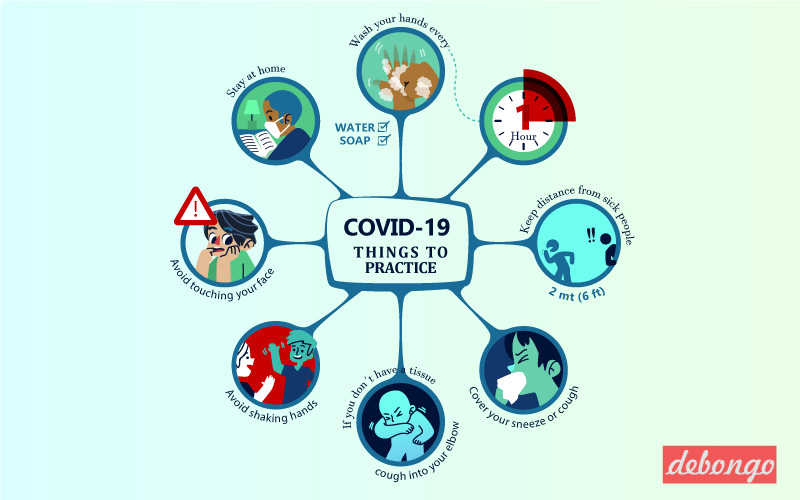What is Corona Virus?
Corona viruses COVID-19 are a vast family of viruses that cause illness ranging from the-common cold – more dreadful diseases such as Severe Acute Respiratory Syndrome and Middle East Respiratory Syndrome (MERS-CoV).
Coronavirus (CoV) is a new strain that has not been before identified in humans.
What You Should Know
- People with Chronic Diseases and Older people are at higher Risk
- Steps to prevent illness
- What to do when sick
- Symptoms
Symptoms
- Fever
- Cough
- Cold
- Shortness of breath
- In severe scenarios, it can cause pneumonia or breathing difficulties
The Virus is spread majorly from person to person
- Among people who are nearly in contact with each another within about 6 feet of distance.
- Droplets are generated via respiratory organ when an infected individual sneezes or coughs.
- These droplets can enter in the noses or mouths of people who are around or possibly be inhaled into the lungs directly.
Can someone spread the Virus without being ill?
People are thought to be exceedingly contagious when they are most symptomatic -the sickest of all. Some spread might be possible before people display symptoms/signs; there have been reports of this taking place with this new Coronavirus, but this is not considered to be the primary way the Virus is spreading. from contact with contaminated objects or surfaces.
It may be viable that a person can get COVID-19 by touching a object or surface that has the virus present and then touching their own nose, mouth, eyes, but this is not measured to be the main way the virus spreads.
The Way The Virus Is Spreading Quickly?
How feasibly the virus spreads from person to person can make a. Some viruses are highly contagious, which spreads easily- like measles, while other viruses do not spread as easily compared to this one. Another agent is whether the spread is, constantly spreading without stopping or sustained at a massive level.
The Virus that spreads or causes COVID-19 seems to be spreading quickly and sustainably in the community in some affected geographic regions.
Community dispersion means people have been infected with the Corona in an area, Who are not aware how did they got infected.
Steps to help stop or reduce the spread of COVID-19 if you are sick
If you are suffering from COVID-19 or suspect you are infected with that causes COVID-19, consider the steps below to help stop the disease from spreading to people in your community, as well as home.
Remain home except to receive medical care/attention.
- Stay home: People who are moderately ill with COVID-19 can isolate at home during such a phase.
You should reduce activities outside of your home, except for obtaining medical attention.
- Avoid public places: Do not go to work, school, or public spaces.
- Avoid public transportation: Avoid using public transport, taxis, or ride-sharing. Separate yourself from other animals and people at home and parks.
- As much as possible, stay away from others: You should remain in a away from other people even in your home. (in a particular room)
- Moreover, you should make use of a separate bathroom, if available at your places.
- Restrict contact with animals & pets: Limit contact with animals and other pets while you are sick with COVID-19, just like you would be around other individuals. Though there are no reports of pets or other animals becoming sick with COVID-19, it is still advisable that people suffering from COVID-19 limit contact with animals until more information is known about the virus, so that the spread must be avoided.
While you are sick, have another member of your household care for your animals. Some of the avoiding factors include; Avoid contact with your pet, such as sharing food, being kissed or licked, and snuggling.
Wash your hands before as well after you interact with pets and never skip on wearing a facemask. See COVID-19 and Animals for more information.
MERS-COV: Middle East Respiratory Syndrome Corona Virus.
It spreads through direct contact. By touching surfaces that are contaminated.
Children should maintain 3 feet distance. Especially from people who are sneezing, coughing, or having a fever.
Call before your doctor visit- If you have a medical appointment, call the healthcare provider and mention them that you have or probably have COVID-19.
This will assist the healthcare provider’s office to take the necessary steps to keep other people from getting exposed or infected.
If you , anaround other people, make it a habit of wearing a facemask. (e.g., sharing a vehicle or room ) or pets and before you visit a healthcare provider’s workplace.
Cover your Sneezes And Coughs.
Make use of tissue to cover your nose and mouth when you sneeze or cough. Dispose of used tissues in a trash container.
Additionally, wash your hands immediately with soap for 20 seconds or, if soap and water are not handy, clean your hands with an alcohol solution hand sanitizer that contains at least 60% alcohol content.
Especially after blowing your nose, sneezing, coughing going to the bathroom and before preparing or eating food.
Avoid sharing personal household items. Do not share- You should not share drinking glasses, cups, dishes, eating utensils, towels, or bedding with pets and other people in your home and other required places.
Wash thoroughly after use: After utilizing these items, they should be washed thoroughly with soap and water.
Cleaning a counter-Clean all “high-touch” surfaces every day clean and disinfect, make it a habit of high touch surfaces include tabletops, doorknobs, bathroom fixtures, counters, toilets, phones, tablets.
Disinfect areas with bodily fluids and clean any surfaces that may have body fluids or blood stool available.
Household cleaners- use a household cleaning wipe or spray according to the label specifications for effective and safe utilization of the cleaning product, including the care you should take when applying the product, such as wearing gloves, ensuring you have proper ventilation during the use of the product.
Discontinuing home isolation
Remain home until advise HAR d to leave- Patients with COVID-19 virus should stay within home isolation preventions until the risk of secondary spread/transsmission to others is thought to be inferior.
Communicate with your healthcare provider: The decision to discontinue home isolation precautions should be made on a case basis, in consultation with state and local health departments and healthcare providers.
Corona Virus can be defeated by majorly by the below-mentioned methods.
1. Developing a potent vaccine against the Virus as a vaccine would influence the body’s immune system to fight the virus and generate antibodies that can stay in the bloodstream for Life. Researchers study a single virus bit by bit, and then they choose a small harmless bit of the virus to serve as a vaccine- In any other cases, they select any fragment from the Virus and deactivate it with chemicals.
2. Well, the second method involves designing a drug that targets either the Virus or the host
– After the virus enters human cells it starts making copies of itself. Then it kills the cell and releases the new copies to infect new cells. Moreover, the drug could block the virus from replicating inside the human cells. But hold on that doesn’t mean the Virus vanishes.
It implies the Virus remains mobile without any activity within the cells of human. During which it could change and come up with even a more aggressive version of itself.
– The drug can also force the infected cell to kill itself by apoptosis- Apoptosis is a procedure in which the cell releases molecules that it eat it from within. Immune cells called phagocytes then takes their stage and ingest the cellular components.
Developing such a drug normally takes 14 years of research, development, and testing, which, as a result, makes this an unlikely solution to the ongoing global outbreak.
3. The third method involves testing existing drugs to see which one could work against the Virus. The virus, in general, share similarities in their genome; some of them can be as high as 90%. This states that the existing drugs for other viruses such as the influenza virus or HIV could resolve the problem and help contain the spread of the Coronavirus. These drugs would aim the similar sites or obstruct the same processes in viral imitation.
– Current reports reveal that anti-HIV drugs are being repurposed to battle against COVID-19
The two drugs have been in action for about 10-15 years and are off-patent.
4. The fourth method involves genetically engineering human T-cell utilizing CRISPR and then injecting the genetically structured cells within the human body. The T-cells are structured to become more potent are identifying and killing the cells which are infected.
– Genetically engineering human T-cells must be done differently and separately for each person, because our genomes are little different, the engineered T-cells won’t work on everyone, which means all infected must have their own T-cells genetically structured.
Given how fast the current outbreak is transmitting and how slow genetic engineering can be , this won’t likely be an ideal solution for the ongoing outbreak. For a moment, our only hope is that a vaccine is developed fast enough to contain the disease. or an existing drug be repurposed to block the Virus from spreading further.
Follow these few practices mentioned in this article and Stay Safe and Keep your loved ones safe too. Take care!!




